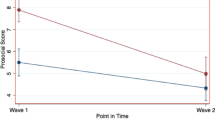Abstract
Military dependent children remain a largely unexplored subject, particularly in early childhood education. In an effort to fill the gap in the current literature, this research study focuses on how early childhood teachers perceive the educational needs of military dependent children. Previous research in the areas of geographic mobility, parental separation, and socioemotional needs are reviewed and used as a platform for this study. The study includes a survey developed by the researcher used in conjunction with Teacher Observation of Classroom Adaptation—Checklist to further examine the needs of these children from the perceptions of their teachers. The results of the study demonstrate that while early childhood teachers do not perceive a significant difference between military and nonmilitary dependent children in the socioemotional domains of prosocial behavior, concentration, and disruptive behavior, they do believe there is a difference related to stability. Additionally, early childhood teachers noted a negative socioemotional and academic impact related to parental separation and a negative academic impact related to geographic mobility. Teachers’ responses indicated mixed beliefs about the social impact of frequent relocations.
Similar content being viewed by others
References
Allen, M., & Staley, L. (2007). Helping children cope when a loved one is in military deployment. Young Children, 62(1), 82–87.
Biddle, B. J., & Anderson, D. S. (1986). Methods, knowledge, and research on teaching. In M. C. Wittrock (Ed.), Handbook of research on teaching (pp. 42–64). New York: McMillian.
Green, B. A., Miller, R. B., Crowson, H. M., Duke, B. L., & Akey, K. L. (2005). Predicting high school students’ cognitive engagement and achievement: Contributions of classroom perceptions and motivation. Contemporary Educational Psychology, 29, 462–482.
Hanson, M. J., Woltberg, P., Zercher, C., Morgan, M., Gutierrez, S., Barnwell, D., & Beckman, P. (1998). The culture of inclusion: Recognizing diversity at multiple levels. Early Childhood Research Quarterly, 13(1), 185–210.
Hardre, P. L., Davis, K. A., & Sullivan, D. W. (2008). Measuring teacher perceptions of the “how” and “why” of student motivation. Educational Research and Evaluation, 14(2), 155–179.
Horten, D. (2005). Consultation with military schools: A proposed model. Consulting Psychology Journal, 57(4), 259–265.
Kelley, M. (2002). The effects of deployment on traditional and nontraditional military families: Navy mothers and their children. In M. G. Enders (Ed.), Military brats and other global nomads: Growing up in organizational families (pp. 3–22). Westport, CT: Praeger.
Kelley, M. L., Hoch, E., Smith, K. M., Jarvis, M. S., Bonney, J. F., & Gaffney, M. A. (2001). Internalizing and externalizing behavior of children with enlisted navy mothers experiencing military induced separation. Journal of the American Academy of Child and Adolescent Psychiatry, 40(4), 464–471.
Koth, C. W., Bradshaw, C. P., & Leaf, P. J. (2009). Teacher Observation of Classroom Adaptation—Checklist (TOCA C): Development and factor structure. Measurement and Evaluation in Counseling and Development, 42, 15–30.
McCaslin, M. L., & Scott, K. W. (2003). The Five-question method for framing a qualitative research study. The Qualitative Report, 8(3), 447–461.
Meisels, S. J. (1999). Assessing readiness. In R. C. Pianta & M. J. Cox (Eds.), The transition to kindergarten (pp. 39–66). Baltimore, MD: Paul H. Brookes.
Morgan, P. (2008). Teacher perceptions of physical education in the primary school: Attitudes, values, and curriculum preferences. Physical Educator, 65(1), 46–56.
Silverman, S., & Subramaniam, P. R. (1999). Student attitude toward physical education and physical activity: A review of measurement issues and outcomes. Journal of Teaching in Physical Education, 19(11), 97–125.
Tabachnick, B. R., & Zeichner, K. M. (1984). The impact of the student teaching experience on the development of teacher perspectives. Journal of Teacher Education, 35(6), 28–36.
Wenglinski, H. (2000). How teaching matters: Bringing the classroom back into discussions of teacher quality. Princeton, NJ: Educational Testing Service.
Zill, N. (1999). Promoting educational equity and excellence in kindergarten. In R. C. Pianta & M. J. Cox (Eds.), The transition to kindergarten: Research, policy, training, and practice (pp. 67–105). Baltimore, MD: Paul Brooks.
Author information
Authors and Affiliations
Corresponding author
Rights and permissions
About this article
Cite this article
Stites, M.L. How Early Childhood Teachers Perceive the Educational Needs of Military Dependent Children. Early Childhood Educ J 44, 107–117 (2016). https://doi.org/10.1007/s10643-015-0698-1
Published:
Issue Date:
DOI: https://doi.org/10.1007/s10643-015-0698-1




